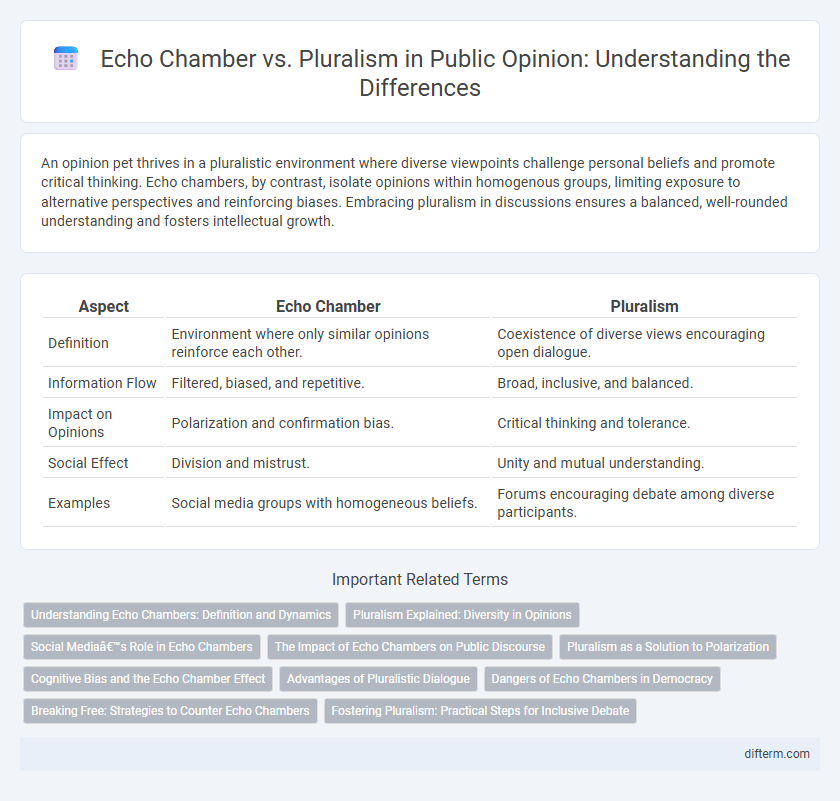An opinion pet thrives in a pluralistic environment where diverse viewpoints challenge personal beliefs and promote critical thinking. Echo chambers, by contrast, isolate opinions within homogenous groups, limiting exposure to alternative perspectives and reinforcing biases. Embracing pluralism in discussions ensures a balanced, well-rounded understanding and fosters intellectual growth.
Table of Comparison
| Aspect | Echo Chamber | Pluralism |
|---|---|---|
| Definition | Environment where only similar opinions reinforce each other. | Coexistence of diverse views encouraging open dialogue. |
| Information Flow | Filtered, biased, and repetitive. | Broad, inclusive, and balanced. |
| Impact on Opinions | Polarization and confirmation bias. | Critical thinking and tolerance. |
| Social Effect | Division and mistrust. | Unity and mutual understanding. |
| Examples | Social media groups with homogeneous beliefs. | Forums encouraging debate among diverse participants. |
Understanding Echo Chambers: Definition and Dynamics
Echo chambers are social environments where individuals encounter information and opinions that reinforce their existing beliefs, limiting exposure to diverse perspectives. These dynamics intensify polarization by filtering out dissenting views, often driven by algorithmic biases in social media platforms. Understanding the formation and impact of echo chambers is crucial for promoting pluralism and fostering a balanced exchange of ideas.
Pluralism Explained: Diversity in Opinions
Pluralism thrives on the coexistence of diverse opinions, fostering robust dialogue and critical thinking essential for democratic societies. Exposure to varied perspectives challenges individual biases and cultivates empathy, enabling more informed decision-making and societal progress. In contrast to echo chambers, pluralism enriches public discourse by promoting inclusivity and intellectual openness.
Social Media’s Role in Echo Chambers
Social media algorithms prioritize content that aligns with users' existing beliefs, amplifying echo chambers by limiting exposure to diverse perspectives. This selective content distribution reinforces confirmation bias and reduces pluralistic dialogue essential for healthy democratic discourse. Users increasingly encounter homogeneous viewpoints, hindering critical thinking and societal cohesion.
The Impact of Echo Chambers on Public Discourse
Echo chambers significantly distort public discourse by reinforcing existing beliefs and limiting exposure to diverse perspectives, which undermines critical thinking and democratic deliberation. In contrast, pluralism promotes a healthy exchange of ideas by encouraging dialogue across different viewpoints, enhancing societal understanding and decision-making. The impact of echo chambers leads to polarization and fragmentation, weakening the foundation of informed public debate.
Pluralism as a Solution to Polarization
Pluralism fosters diverse perspectives, encouraging open dialogue that reduces societal polarization more effectively than echo chambers, which reinforce existing biases. Embracing pluralism promotes critical thinking, mutual understanding, and democratic resilience by integrating varied viewpoints into decision-making. This inclusive approach mitigates extreme polarization by creating spaces where conflicting ideas coexist constructively.
Cognitive Bias and the Echo Chamber Effect
The echo chamber effect intensifies cognitive bias by reinforcing preexisting beliefs through selective exposure to homogeneous viewpoints, limiting critical thinking and open dialogue. Unlike pluralism, which encourages diverse perspectives and cognitive flexibility, echo chambers create a feedback loop that amplifies misinformation and ideological polarization. Understanding these dynamics is crucial to fostering intellectual humility and mitigating the social fragmentation driven by biased information consumption.
Advantages of Pluralistic Dialogue
Pluralistic dialogue fosters diverse viewpoints, enhancing critical thinking and reducing confirmation bias prevalent in echo chambers. By encouraging open exchange, it promotes social cohesion and innovation through collaborative problem-solving. Such inclusive conversations also empower marginalized voices, enriching democratic processes and decision-making.
Dangers of Echo Chambers in Democracy
Echo chambers threaten democracy by limiting exposure to diverse perspectives, fostering polarization, and reinforcing extreme viewpoints. These environments undermine informed decision-making and erode mutual understanding among citizens, weakening democratic discourse. The persistence of echo chambers increases social fragmentation and diminishes the capacity for consensus-building essential to healthy democratic governance.
Breaking Free: Strategies to Counter Echo Chambers
Breaking free from echo chambers requires actively seeking diverse perspectives through engaging with multiple information sources and critical thinking practices. Encouraging open dialogue and exposure to contrasting viewpoints fosters cognitive flexibility and reduces polarization. Digital literacy education and algorithmic transparency also play crucial roles in countering filter bubbles and promoting pluralism.
Fostering Pluralism: Practical Steps for Inclusive Debate
Fostering pluralism requires creating platforms where diverse perspectives are actively encouraged and respected, breaking the confines of echo chambers that reinforce homogeneous views. Implementing structured dialogue protocols and promoting media literacy empower participants to engage critically and empathetically, enriching public discourse. Encouraging cross-cultural exchanges and community forums further broadens understanding, ensuring more inclusive and representative debates.
echo chamber vs pluralism Infographic

 difterm.com
difterm.com